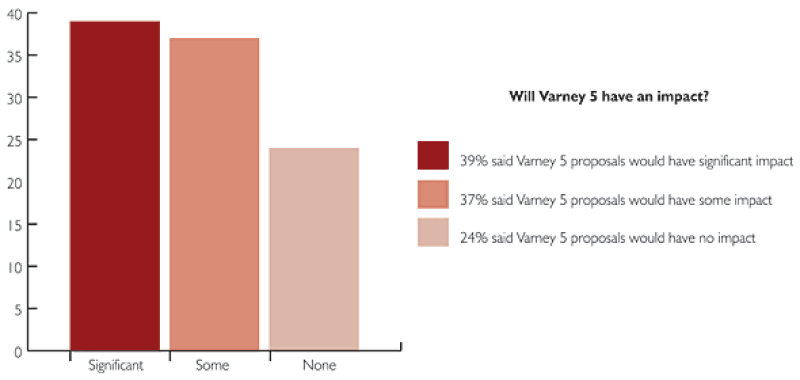in association with Chiltern |

|
Transfer pricing is a significant business issue for many multinational groups who are increasing their sophistication with respect to the complex issues at play. These key developments have occurred in recent years:
New transfer pricing legislation (for example, Spain, Norway, Sweden)
Amended/extended transfer pricing legislation (for example, China, India, UK)
The increased attention of tax authorities to transfer pricing (resulting in an increase in audits and high profile transfer pricing cases with large financial settlements)
Increased reporting requirements for tax uncertainty (the subjectivity of transfer pricing places it at the heart of tax uncertainty assessments and the tax provisions process)
Increased pressure on groups to manage and reduce group effective tax rates
To assist in addressing the issues, the tax departments of many international groups have added transfer pricing expertise.
Survey results
Question 1: Have you had a transfer pricing audit in the past three years?
One-third of groups responded that the UK tax authorities had conducted a transfer pricing audit of their company in the past three years.
The responses to this question demonstrate the extent of HMRC's approach to transfer pricing. The June 2007 'HMRC approach to Transfer Pricing for Large Business' consultation paper claimed that 1,000 cases were actually resolved in 2006/2007 and that 580 issues remained open at April 1 2007. It is likely that the trend for increased transfer pricing audit activity will continue.
The UK tax authorities (and tax authorities the world over) have been relentless in their approach to transfer pricing audits and the reason is twofold:
This first annual survey of UK taxpayers' opinions on transfer pricing was conducted during July and August. ITR and Chiltern thank the many firms that participated in this exercise, which has produced a high quality survey with important conclusions that have been fed, on an anonymous basis, to HM Revenue and Customs (International), the international division of the UK tax authorities. The first survey in this annual initiative reviews UK based groups given the current drive from HMRC International to improve the existing process. Five hundred large UK based multinational groups were contacted by phone and e-mail. Forty-nine responded (40% of which are among the UK FTSE 100 & 250). The number of large UK groups responding demonstrates the importance of transfer pricing and the desire for in-house tax departments to speak to the issues.
|
Intragroup pricing can provide international groups with the opportunity to achieve cross-border tax arbitrage and has historically created an assumption with tax authorities that it is purely a tool to design effective tax planning structures. While transfer pricing legislation in many jurisdictions does not consider motive, experience has shown that tax authorities are more likely to instigate an audit where there is no commercial basis for a particular pricing structure. Scepticism on the part of tax authorities has contributed to the degree of transfer pricing audit activity.
Transfer pricing inv-olves a substantial treatment of economics which may involve judgement, assumptions and a degree of subjectivity. This presents a grey area in which tax authorities can raise a challenge as opposed to an area of taxation law where, for example, case law precedents may exist to alleviate the subjectivity.
Question 2: How would you compare the focus of the UK tax administration to that of other major jurisdictions?
Roy Warden of HMRC (International) came up with this question to assist the current research undertaken by his division. He, understandably, wanted to compare the focus of the UK to that of the other major jurisdictions around the world. While 24% of groups labelled HMRC as 'more aggressive', many commented on HMRC's flexible and sophisticated approach. That said, two-thirds of groups participating in the survey have not had a transfer pricing audit from the UK authorities yet and may think differently should such an audit occur.
Question 3: What impact will Varney 5 have on your business?
Varney 5 is an initiative from the UK tax authorities to make transfer pricing audit times of 18 months the norm (three years for 'complex' and 'high risk' cases).
Thirty-nine percent of groups stated that the Varney 5 proposals to reduce transfer pricing audit times would have a significant impact on the business while only 24% stated that Varney 5 would have no impact at all. Thirty seven percent stated that Varney 5 would probably have some impact.
One key aspect of Varney 5 is to consider if a group is 'complex and high risk' for the purposes of transfer pricing audits. Only 7% of groups expected to fall into the complex and high risk category, though the groups surveyed are among the largest businesses in the UK.

|
Question 4: What are the strengths and weaknesses of your professional advisers' approach to transfer pricing?
Strengths listed for current transfer pricing advisers included good industry knowledge and technical expertise; however, 24% of groups mentioned that a non-specific or 'cookie-cutter' approach (that is, reports that are standardised and do not adequately take into account client and industry specifics) to transfer pricing is a significant weakness of their current professional advisers. Eighteen percent of groups confirmed that being overcharged for transfer pricing services is a significant concern.
A tailored, flexible approach to transfer pricing which assesses the degree of risk and involves the client in all aspects of the process appears to sit more closely with client needs. In addition to this, deep industry knowledge and experience has always been a strong factor in influencing groups in their choice of transfer pricing advisers.

|
Question 5: Do you support a risk based approach to transfer pricing audits?
Eighty-six percent of groups participating in the survey support a risk-based approach to transfer pricing audits, recognising that such an approach sits logically with the lack of resource both at these groups and at HMRC.
HMRC tax bulletin 37 issued as long ago as October 1998 and tax bulletin 60 issued in August 2002 advocate a risk-based approach to transfer pricing documentation and transfer pricing audits.
Question 6: Do you prepare transfer pricing documentation in house?
The survey shows that 82% of respondents perform a degree of transfer pricing documentation in-house. This is a high percentage and demonstrates that the transfer pricing market has shifted from its historic preference for external advisors to prepare all documentation.
Many clients appear to prefer a collaborative app-roach to transfer pricing risk assessments and documentation; the significant industry expertise and knowledge of transactions that exists in many in-house tax departments can be crucial to the compilation of transfer pricing reports and arguably a collaborative approach produces a stronger and more commercial result.

|
Shiv Mahalingham, head of transfer pricing, Chiltern |
Question 7: Do you believe that the frequency and intensity of transfer pricing audits in the UK are increasing?
Fifty-five percent of groups stated that they believed that the frequency and intensity of UK transfer pricing audits was increasing. Varney 5 may split the transfer pricing audit population between (1) high risk and complex, and (2) other. The 'other' category of group (that is, neither high risk nor complex) may actually witness a reduction in the likelihood of a transfer pricing audit.
Question 8: Does UK tax policy support business?
39% of groups said 'no'.
Many groups commented on the increasing complexity of the UK tax system. Recent initiatives in the UK (including for example the proposed exemption for overseas dividend income) appear to recognise the ground the UK lost to Ireland and the Netherlands, among others. as an attractive holding company location in Europe – however, there seems to be a strong feeling among groups that the UK tax system could do more to encourage business.
Some groups presented interesting arguments as to whether it is the function of tax policy to support business.
Question 9: What elements of the UK tax system, if they got worse, would make you consider relocating all or part of your operations outside of the UK?
Some large UK-based groups have threatened to take operations out of the UK if tax policy does not improve.
Forty-seven percent of groups participating in the survey confirmed that tax would have an impact on the decision to move operations out of the UK. This is a high percentage. Though there would be other judgements in any decision; however, tax appears to be more prominent in boardroom deliberations than has previously been the case.

|
Shiv Mahalingham (mahalinghams@chilternplc.com), head of transfer pricing at tax advisers Chiltern plc , the UK member of the Taxand global network.










